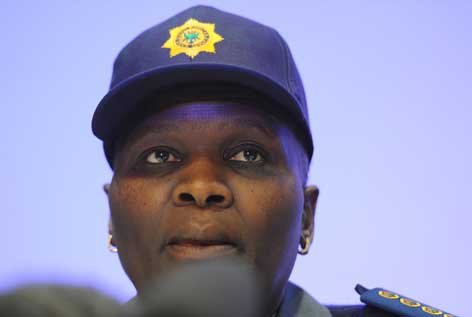Employers write to Phiyega over metals strike
Updated | By Catrine Malan

Steel and Engineering Industries Federation of SA (Seifsa) chief executive Kaizer Nyatsumba said its members had reported cases of striking workers behaving unlawfully and, in some cases, violently.
"We are extremely disappointed with the violent behaviour of some union members who have embarked on a wanton campaign of damaging properties... of some of our member companies in the Wadeville and Isando areas since the beginning of the strike."
The two areas are on Gauteng's East Rand.
In his most recent letter to Phiyega, dated Tuesday, Nyatsumba said war-like rhetoric of some union leaders led to fears that non-striking workers would be coerced into joining the strike.
He called on police to prepare for a potentially violent strike.
About 220,000 members of the National Union of Metalworkers of SA (Numsa), the majority union in the metals and engineering industries, began an indefinite strike on Tuesday.
They were joined by members of the Chemical, Energy, Paper, Printing, Wood, and Allied Workers' Union, and the General Industries Workers' Union of SA.
Nyatsumba wrote to Phiyega: "We would deeply regret the loss of life in the course of this strike, and we hope most sincerely the SAPS will work hard to prevent such a possibility."
On Thursday morning police used rubber bullets to disperse a crowd, believed to be strikers in the metals and engineering sector, at the Medupi power station in Limpopo, Colonel Ronel Otto said.
"A few hundred workers blocking gates into the premises did not heed the call of police to disperse," she said.
Police fired rubber bullets above their heads, and after this the crowd dispersed peacefully.
Public order police were keeping watch and no further incidents were reported by early afternoon, Otto said.
Eskom could not immediately be reached for comment.
Nyatsumba said unions had refused to sign a peace accord and this matter was referred to the Commission for Conciliation, Mediation, and Arbitration.
"Leaders of organised labour have to step forward and accept responsibility for the conduct of their members during a strike," he said.
Employers have tabled a three-year wage offer of between seven and eight percent for different levels of workers in the first year, and CPI-linked increases for 2015 and 2016.
Numsa wanted a one-year bargaining agreement, including a 15 percent wage increase, a R1000 housing allowance, and the scrapping of labour brokers.
Last Thursday Numsa deputy general secretary Karl Cloete said the union had dropped from a 15 percent increase demand to one of 12 percent.
On Thursday, however, Numsa spokesman Castro Ngobese said the union was sticking to its 15 percent demand.
Seifsa spokeswoman Ollie Madlala said talks with Numsa would take place later on Thursday.
Ngobese said the union would respond to Seifsa's claims of intimidation and violence later on Thursday.
On Wednesday he dismissed a report that a building belonging to a metal company in Selby industrial park, Johannesburg, had been vandalised by strikers.
"That is the worst form of propaganda," Ngobese said.
"Anyone that says that the strike was violent is promoting violence."

Show's Stories
-
Model Marciel Hopkins wys haar eersteling
Die voormalige 'Boer Soek 'n Vrou'-aanbieder en haar aantreklike man, Ha...
The Drive with Rob & Roz 1 day, 15 hours ago -
WATCH: SA reacts to TikToker's new spin on a classic SA dish
If you are bored of eating normal pap, here is a new recipe for you to try.
The Drive with Rob & Roz 1 day, 16 hours ago